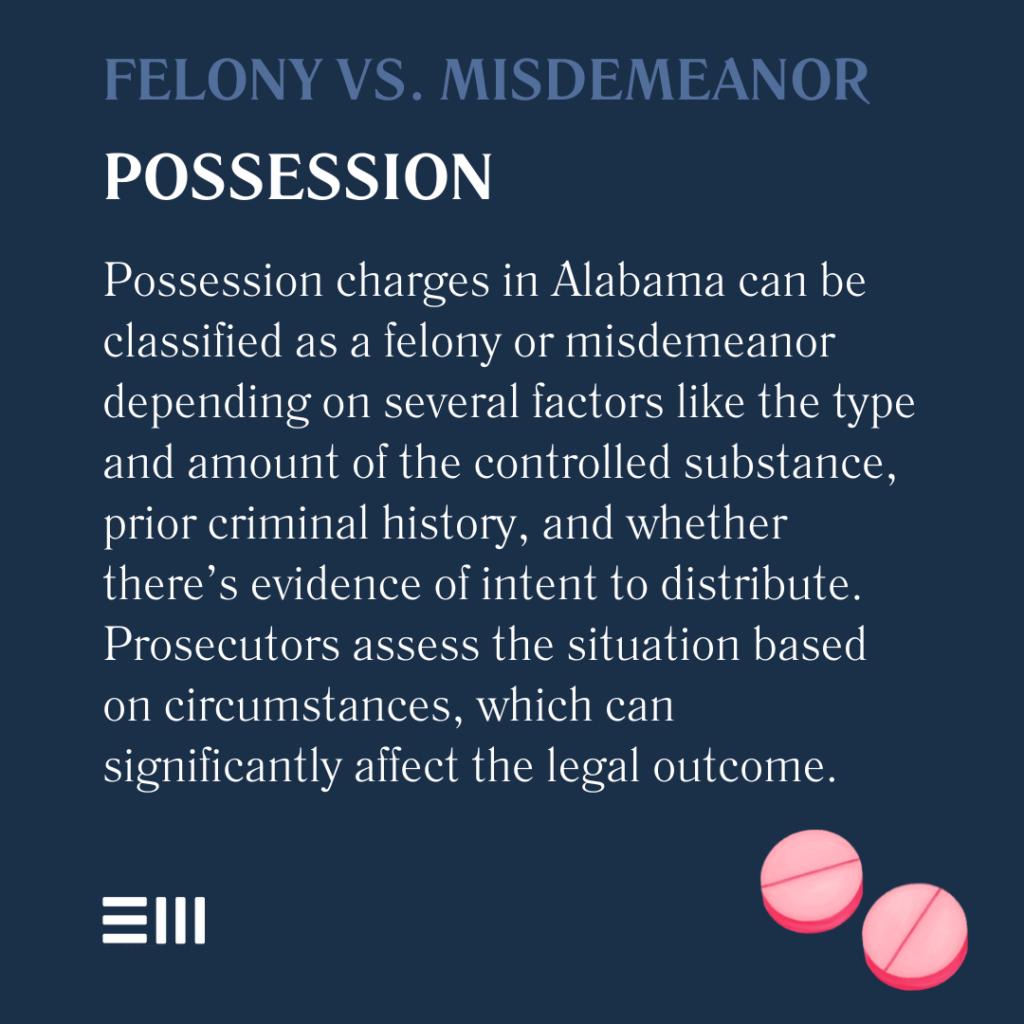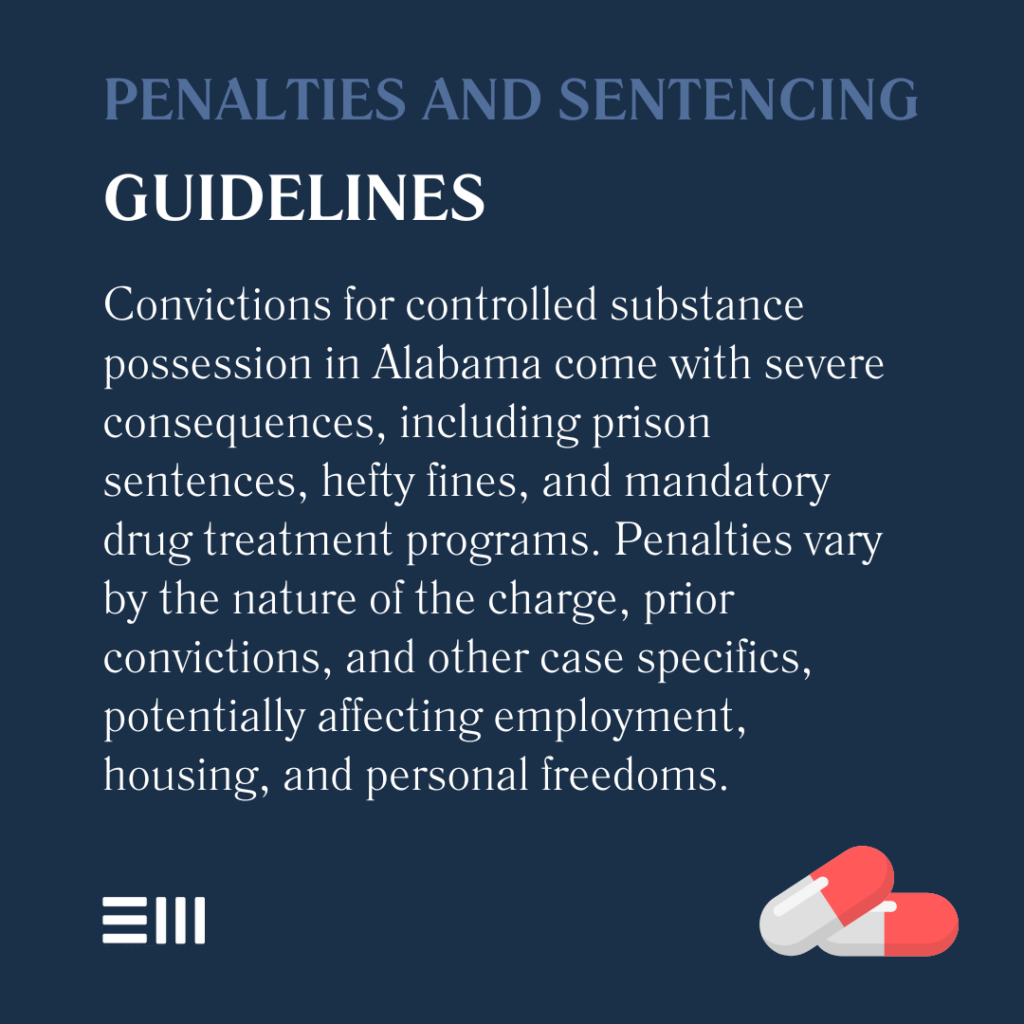
One phone call changes everything. In an instant, a routine traffic stop or casual encounter with law enforcement transforms into a life-altering criminal charge.
Across Alabama courtrooms, individuals face the stark reality that possession of even small amounts of controlled substances can lead to felony charges, permanently reshaping their future opportunities, relationships, and freedom.
The path from arrest to resolution often feels overwhelming, but understanding your rights and options creates the foundation for informed decisions.
Understanding Controlled Substance Classifications
Alabama categorizes controlled substances into different schedules based on their medical use, potential for abuse, and safety under medical supervision.
These classifications directly impact the severity of possession charges and potential penalties.
The state’s drug schedules determine not only the classification of the offense but also influence sentencing guidelines and available defense strategies.
Understanding these distinctions helps defendants navigate their legal options effectively. Each schedule carries specific implications for charging and sentencing decisions.
Alabama’s Schedule Classifications and Examples
Different drug schedules carry varying legal implications. Understanding which schedule applies to specific substances helps clarify potential charges and consequences.
Common substances in each schedule include:
Schedule I:
- Heroin;
- LSD;
- Ecstasy (MDMA);
- Peyote;
- Synthetic cannabinoids;
- Bath salts;
- GHB;
- Some research chemicals;
- Certain hallucinogens; and
- Modified analogs.
Schedule II:
- Cocaine;
- Methamphetamine;
- Oxycodone;
- Fentanyl;
- Morphine;
- Opium;
- Hydromorphone;
- Methadone;
- Amphetamines; and
- Raw opium derivatives.
Schedule III:
- Anabolic steroids;
- Ketamine;
- Testosterone;
- Codeine combinations;
- Some barbiturates;
- Buprenorphine;
- Marinol;
- Limited narcotics;
- Appetite suppressants; and
- Certain sedatives.
Schedule IV:
- Xanax;
- Valium;
- Ambien;
- Tramadol;
- Soma;
- Ativan;
- Darvon;
- Clonazepam;
- Sleep medications; and
- Anti-anxiety drugs.
Schedule V:
- Cough medicines with codeine;
- Robitussin AC;
- Lomotil;
- Lyrica;
- Parepectolin;
- Limited stimulants;
- Certain anticonvulsants;
- Some antidiarrheals;
- Low-dose opioids; and
- Select decongestants.
These classifications guide law enforcement and prosecutors in determining appropriate charges.
Felony vs. Misdemeanor Possession in Alabama
Not all drug possession charges result in felony prosecution. Several factors determine whether possession will be charged as a felony or misdemeanor in Alabama.
Key determining factors include:
- Quantity of substance possessed;
- Type of controlled substance;
- Prior criminal history;
- Location of possession;
- Presence of paraphernalia;
- Intent to distribute evidence;
- Proximity to schools or churches;
- Presence of weapons;
- Concurrent criminal charges;
- Age of the defendant;
- Cooperation with law enforcement;
- Packaging methods;
- Source of the substance;
- Method of discovery;
- Presence of cash or scales;
- Laboratory test results;
- Chain of custody documentation;
- Witness statements;
- Vehicle involvement; and
- Property ownership questions.
These factors guide prosecutors in determining appropriate charges and potential plea agreements.

Penalties and Sentencing Guidelines for Substance Possession in Alabama
Alabama law establishes specific penalties for controlled substance possession. Understanding potential sentences helps defendants make informed decisions about their cases.
Possible consequences include:
- Prison sentences (1-10 years typical);
- Mandatory minimum sentences;
- Fines up to $15,000;
- Probation requirements;
- Drug treatment programs;
- Community service;
- License suspension;
- Property forfeiture;
- Random drug testing;
- Electronic monitoring;
- Travel restrictions;
- Employment limitations;
- Housing restrictions;
- Firearm prohibition;
- Immigration consequences;
- Mandatory counseling;
- Rehabilitation costs;
- Court supervision fees;
- DNA sample requirements; and
- Treatment program fees.
These penalties vary based on circumstances and prior convictions, making each case unique.

Search and Seizure Issues
Understanding search and seizure laws proves crucial in drug possession cases. Proper police procedure often becomes a central issue in building a defense.
Critical considerations include:
- Warrant requirements;
- Consent searches;
- Vehicle exception rules;
- Plain view doctrine;
- Terry stop limitations;
- Emergency exceptions;
- Inventory searches;
- Administrative searches;
- Border search rules;
- Knock and announce requirements;
- Private property rights;
- Curtilage definitions;
- Electronic surveillance;
- Thermal imaging restrictions; and
- GPS tracking rules.
These legal principles often determine evidence admissibility.
Legal Defenses and Strategies
Various legal defenses may apply to controlled substance possession charges. Understanding potential defenses helps develop effective legal strategies.
Common defense approaches include:
- Illegal search and seizure;
- Chain of custody issues;
- Lab testing challenges;
- Constructive possession disputes;
- Prescription documentation;
- Medical necessity claims;
- Fourth Amendment violations;
- Miranda rights violations;
- Entrapment arguments;
- Actual possession questions;
- Standing to challenge search;
- Probable cause challenges;
- Witness credibility issues;
- Alternative suspect theories;
- Constitutional violations;
- Statute of limitations;
- Speedy trial rights;
- Double jeopardy claims;
- Prosecutorial misconduct; and
- Evidence tampering allegations.
Each defense requires careful evaluation and supporting evidence.
Treatment and Alternative Programs
Alabama offers several alternative programs for qualifying defendants. These programs can provide options beyond traditional prosecution and punishment.
Available programs include:
- Drug court participation;
- Pretrial diversion;
- Rehabilitation programs;
- Intensive outpatient treatment;
- Residential treatment options;
- Support group requirements;
- Counseling services;
- Job training programs;
- Education requirements;
- Community service options;
- Mental health treatment;
- Substance abuse evaluation;
- Family counseling;
- Life skills training;
- Recovery support services;
- Anger management classes;
- Parenting programs;
- Financial management courses;
- Stress management training; and
- Relapse prevention education.
Successful program completion may lead to reduced charges or case dismissal.
Evidence Handling and Testing
Understanding how controlled substances are tested and processed affects case outcomes. Proper evidence handling procedures must be followed.
Important procedures include:
- Initial field testing;
- Laboratory confirmation;
- Chain of custody documentation;
- Evidence storage requirements;
- Transportation protocols;
- Sample preservation;
- Testing methodology;
- Equipment calibration;
- Expert qualifications;
- Report preparation;
- Cross-contamination prevention;
- Quality control measures;
- Retesting procedures;
- Documentation requirements; and
- Witness testimony preparation.
These procedures often become crucial elements in defense strategies.
Long-term Consequences
Felony drug possession convictions carry implications beyond immediate legal penalties. Understanding these long-term effects helps inform decision-making during case proceedings.
Lasting impacts include:
- Employment limitations;
- Housing restrictions;
- Educational barriers;
- Professional license loss;
- Voting rights impact;
- International travel restrictions;
- Federal benefits loss;
- Child custody effects;
- Military service prohibition;
- Immigration status changes;
- Credit score impact;
- Insurance rate increases;
- Background check issues;
- Social stigma;
- Future criminal charges;
- Retirement benefits;
- Security clearances;
- Adoption eligibility;
- Volunteer opportunities; and
- Professional certifications.
These consequences emphasize the importance of strong legal representation.
Frequently Asked Questions About Drug Possession in Alabama
Many individuals facing controlled substance charges share common concerns.
Here are answers to frequently asked questions about drug possession in Alabama.
What Makes Possession a Felony Instead of a Misdemeanor?
Factors include substance type, quantity, and circumstances of possession, with most Schedule I and II substances automatically charged as felonies.
Can First-Time Offenders Avoid Felony Charges?
Some first-time offenders may qualify for diversion programs or reduced charges through plea agreements.
How Does Prescription Drug Possession Differ?
Valid prescriptions provide legal defense, but possession without prescription often results in felony charges.
What if Drugs Were Found in My Car but Weren’t Mine?
Constructive possession laws may apply even if substances belong to someone else.
Will I Lose My Professional License?
Many professional licenses face suspension or revocation upon felony drug conviction.
Can Drug Charges Be Expunged?
Some charges may qualify for expungement after program completion or case dismissal.
How Long Do Drug Cases Typically Take?
Resolution timelines vary from several months to over a year depending on case complexity.
What Happens at the First Court Appearance?
Initial hearings address bail, charges, and legal representation arrangements.
Fight Harder, Fight Smarter
A controlled substance charge doesn’t have to define your future.
Our experienced criminal defense attorneys in Alabama understand Alabama drug laws and can help protect your rights while pursuing the best possible outcome for your case.
Contact us for a confidential consultation about your legal options.
Can't find what you're looking for? Search our site below.










